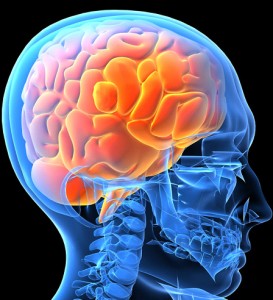Middle Aged? Believe it or not, you’ve never been brainier
By Barbara Strauch

The middle-aged brain – rather than giving up and giving in – adapts, powering up to use more of itself to solve problems
Standing in my cellar I look around me, trying to jog my memory. I’ve come downstairs to get something. The question is, what? I stare at the shelves where I store big pots and pans. Was it the pasta dish? My mind is suddenly, inexplicably, blank.
I stare at my hands. Maybe if I look long enough, I’ll get a picture in my mind, a clue as to what I came downstairs to put into those hands.
This is maddening. I consider going upstairs to survey the scene to figure out what’s missing, like one of those children’s puzzles where, after looking at a picture, you then look at a second picture and try to find what’s been removed from the first one.
But I don’t want to go back upstairs. That’s ridiculous. I stare at the shelves again. Lightbulbs? Nothing. I give up and walk back upstairs. I scan the kitchen. And then I see it — the empty paper towel holder. Agghh!
I turn and go downstairs again, this time repeating to myself over and over: ‘Paper towels, paper towels, paper towels, paper towels.’
We all worry about getting old. We all worry about getting sick. But we really worry about losing our minds. Are our brains on an inevitable downward slide?
As I reached middle age I thought that this, sadly, was the case.
But then I noticed something else. At work, at home, with friends, I was surrounded by people who knew what they were doing. These were people, also in the thick of middle age, who, despite not remembering the name of the restaurant they’d just eaten in or the book they just read, were also structuring complex deals between oil companies on different continents, then coming home to cook complicated recipes.
These were people who could simultaneously write an email to a daughter who was unhappy at university, sort paperwork and participate in a conference call with colleagues.
Over the years, we’ve been trained to think the body and the brain age in tandem. Certain bodily changes are undeniable. Despite my best efforts — regular runs, laps at the pool, yoga — I’m 20lb heavier than I ever was before.
I need glasses that correct for three different distances — reading, driving, and writing on a computer. And as we watch our bodies ageing we assume there’s equivalent decay inside our heads. It’s not hard to imagine our brain cells drying up, or disappearing altogether, too.
But what’s actually happening turns out to be much more complicated. Indeed researchers — from sociologists and psychologists to neuroscientists — have discovered that middle-aged brains do not necessarily act like the rest of our bodies at all.
It’s true, parts of our memory wane. Researchers meticulously tracking the brain as it ages in humans and animals found distinct declines, for instance, in the brain chemicals that keep us alert and on the move.
As a result some brain functions simply do not keep up. If you think, at 55, that you’ll be able to keep pace in all areas with an average 25-year-old — to swerve as quickly to avoid a squirrel in the road or adjust as quickly to yet another new computer system at work — think again.
It’s true, parts of our memory wane. Researchers meticulously tracking the brain as it ages in humans and animals found distinct declines, for instance, in the brain chemicals that keep us alert and on the move.
But at the same time, our ability to make accurate judgments about people, about jobs, about finances — about the world around us — grows stronger. Our brains build up patterns of connections, interwoven layers of knowledge that allow us to instantly recognise similarities of situations and see solutions.
There’s also evidence that as a group we’re considerably smarter than any similarly aged groups that went before us. Indeed, even the long-held view that our brains lose millions of brain cells through the years has now been discounted.
Using brain scanners and watching the brains of real people ageing in real time, researchers have shown that brain cells do not disappear in large numbers with the normal ageing process.
Most stick around for the long haul and, given half a chance, can be there intact well into our 80s and beyond.
There are recent findings, too, that show the middle-aged brain — rather than giving up and giving in — adapts, powering up to use more of itself to solve problems.
Furthermore, around middle age, we start growing happier, and the cause may be ageing itself. In particularly hard or stressful moments it might not seem likely, but the positive wins over the negative in how we see the world, in part because we start to use our brains differently.
So let’s look more closely at the surprising talents of the middle-aged brain.
Twice as Powerful
Perhaps it’s out of a sense of panic but sometime in middle age we begin to develop the ability for bilateralisation — when faced with a perplexing problem, to use both sides of our brain instead of one.
One of the first scientists to spot this was Dr Cheryl Grady, a neuroscientist at the University of Toronto. In the early Nineties she observed the ageing brain with positron emission tomography (PET) scans. These measure changes in blood flow as brain regions activate, and Grady wanted to find out if an older brain acted in the same way as a younger one in routine tasks such as matching faces.
She assumed they’d be much worse and muster fewer brain cells. But to her surprise, the older adults performed just as well as the younger ones, and they consistently used more of their brains, not less. Older adults used their brains in a new way. They tapped into the same brain circuits as the younger adults, but they also recruited an additional region — their powerful frontal cortex, the front of the brain which is responsible for problem solving.
We have two frontal cortex, one on each side of the brain (known as hemispheres). Just a few years after Dr Grady’s discovery, another study found that while young people switched between sides, older adults used them both at once.
An intriguing aspect of this two-brain phenomenon is that it’s not the weakest brains that do this but the most capable who resort to this trick. It’s as if the best and the brightest older brains, accustomed to being held in the highest esteem, simply refuse to give in. As Grady herself concludes: ‘The higher the education, the more likely the older adult is to recruit frontal regions, resulting in better memory performance.’
Perfect Logic
Despite long-held beliefs that we become less clever as we age, there’s mounting evidence to suggest the contrary — that we become cleverer.
How can that be? How can we possibly be cleverer and be putting the bananas in the laundry basket and unable to remember why we’ve come to the hardware store?
One of the longest, largest and most respected life-span studies, the Seattle Longitudinal Study, was started in 1956 and has systematically tracked the mental powers of 6,000 people for more than 40 years.
Led by Sherry Willis, a psychologist, the study has found that people function better on cognitive tests in middle age, on average, than they do at any other time tested.
The abilities that Willis and her colleagues measured include vocabulary — how many words you can recognise and find synonyms for; verbal memory — how many words you can remember; number ability — how quickly you can do multiplication, division, subtraction, and addition; spatial orientation; perceptual speed — how fast you can push a button when you see a green arrow; and inductive reasoning — how well you solve logical problems.
What the researchers found is astounding. During the span of time that constitutes the modern middle age — roughly 40 through to the 60s — the people in the study did better on tests of the most important and complex cognitive skills than they had when they were in their 20s.
In vocabulary, verbal memory, spatial orientation, and, perhaps most heartening of all, inductive reasoning — people performed best, on average, between 40 and 65.
Top performance was reached a bit earlier for men, who peaked in their late 50s, while women’s scores kept climbing into their 60s.
Impeccable Judgment
It’s said that the true test of a human brain is its ability to figure out other human brains. And research shows that judgment does improve with age. Thomas Hess, a psychologist at North Carolina State University, has done studies of what he calls ‘social expertise’, which he finds peaks in midlife, when we are far better than those younger and older at judging the true character of others.
By middle age, we not only have more years of experience, but the brain cells devoted to navigating the human landscape turn out to be exceptionally durable.
Scanning studies show that parts of the brain that deal more with regulating emotion shrink less quickly than other areas as we age. And it’s that mix of emotional control, mental prowess, and life experience that helps us make the right calls.
David Laibson, from Harvard University, has done fascinating studies in the emerging field of ‘neuroeconomics’ — how people use their brains to make financial decisions — and he, too, finds we’re most adept at this in middle age.
When confronting complex money issues, such as mortgages or interest rates, those in middle age make the best choices; in fact, our economic judgment is best in our 50s.
It may be what holds the areas of the brain together that’s also important. This is known as the white matter, which is made up of myelin — the fatty outer coating of the trillions of nerve fibres. Myelin acts like insulation on a wire and makes the connections work.
This layer of fat, some experts believe, is what makes the brain work so well in middle age. Scan studies of the brains of men aged 19 to 76 have found that in two crucial areas of the brain, the frontal lobes and the temporal lobes — the region devoted to language — myelin continued to increase well into middle age, peaking, on average, at around 50, and in some, continuing to build into the 60s.
Ever the Optimist
Many of us grew up dreading old age and its chronic disappointments. But what actually happens is that our moods get not worse but better.
I must say, this idea seemed more than odd to me at first. In the thick of middle age myself, cheeriness is not the first word that comes to my mind. But as we get older we actually react less to negative things — we know this thanks to scans of the amygdala, a small, primitive part of the brain that decides how we are going to react to a situation.
The amygdala’s default setting is pretty much to respond negatively. But now brain scans have suggested that our amygdalae respond less and less to negative stimuli as we age. Our brains, in some automatic way, begin to accentuate the positive and eliminate the negative.
The Secrets of Preserving your Brain Power
Middle age is a kind of crossroads, and the very fabric of our daily lives may influence how we respond to disease, brain injury, or even the more subtle changes that come with age.
This is the fundamental idea behind what’s now called ‘cognitive reserve’, that some brains have, or can develop, a reservoir of strength that, when the going gets rough, offers protection.

The closest thing we have to a magic wand for the brain and the best builder of connections, is exercise
It’s not that those with cognitive reserve are smarter in the conventional sense. Rather, they seem to have an emergency stash of brainpower – perhaps stronger, more resilient, or more efficient brain connections or repair systems that can be called up when necessary.
One of the most prominent producers of this extra brain power is education, which enabled people to call on more parts of their brains when needed, also offering a kind of overall protection against problems such as dementia.
In addition, a landmark study found that over a five-year period, those who had done more to activate their neurons with ‘cognitive stimulating activities’, such as reading and taking music lessons, were about half as likely to develop Alzheimer’s.
But the closest thing we have to a magic wand for the brain and the best builder of connections, is exercise.
In one study, those who spent just an hour walking around a gym three times a week — at a pace of three miles an hour — had brain volumes of people three years younger.
This article was adapted from The Secret Life Of The Grown-up Brain: Discover the Surprising Talents of the Middle-Aged Mind by Barbara Strauch, published by Penguin. Click on the box below to see this book on Amazon
